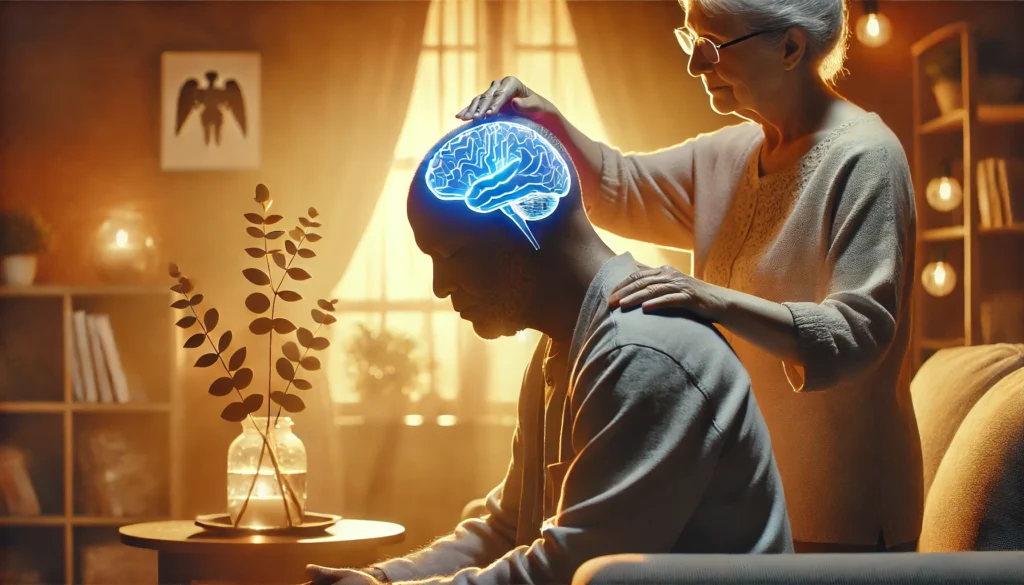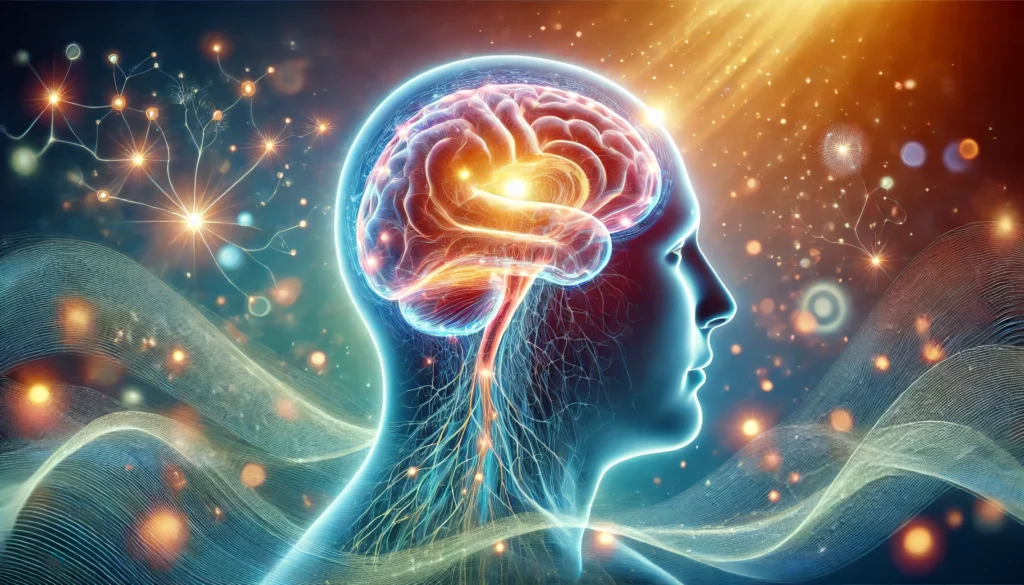Understanding Traumatic Brain Injury and Its Impact on Neural Pathways
Traumatic brain injury (TBI) is a complex condition that affects millions of individuals each year, often resulting from car accidents, falls, or sports-related injuries. The TBI meaning encompasses any disruption in normal brain function due to external force. In cases of car accident head trauma, the brain undergoes sudden acceleration and deceleration, leading to potential bruising, bleeding, or swelling. These injuries can have profound effects on cognitive abilities, emotional regulation, and overall neurological function.
You may also like: How to Retrain Your Brain: Harnessing Neuroplasticity to Overcome Anxiety and Strengthen Neural Pathways
Neural pathways, which serve as the communication networks of the brain, are often disrupted following a TBI. The extent of damage varies depending on factors such as impact force, location of injury, and the presence of secondary complications like brain contusion or swelling. Understanding how TBIs are diagnosed is crucial for effective treatment, as imaging techniques such as MRIs and CT scans help determine the severity and location of injury. This knowledge sets the foundation for designing effective rehabilitation strategies aimed at strengthening neural pathways and facilitating brain recovery.

The Spectrum of Brain Injuries: From Mild to Severe
The classification of brain injuries helps medical professionals determine appropriate interventions. A closed craniocerebral trauma, often resulting from car accidents, involves brain damage without skull penetration. Conversely, an open brain injury occurs when an object pierces the skull, potentially leading to severe neurological damage. Brain contusion, a form of bruising on the brain’s surface, can lead to cognitive impairments and long-term complications if not properly managed.
TBI symptoms vary widely depending on the severity of the injury. Mild TBIs, commonly referred to as concussions, may cause temporary confusion, headaches, and dizziness. Moderate to severe TBIs can lead to prolonged unconsciousness, memory deficits, and motor impairments. Understanding the different types of brain injuries allows healthcare professionals to tailor treatments that promote neural repair and optimize cognitive function.
Mechanisms of Neural Pathway Disruption and Repair
Neural pathways are formed through repeated patterns of activity, creating strong connections between different regions of the brain. When a TBI disrupts these pathways, communication between neurons becomes impaired, leading to cognitive, emotional, and motor difficulties. In cases of brain injury from a car accident, sudden impact forces can shear neuronal connections, making recovery challenging.
However, the brain possesses remarkable plasticity, allowing it to adapt and reorganize damaged networks. This process, known as neuroplasticity, is the foundation of brain trauma recovery. Through targeted rehabilitation, neural pathways can be reinforced, enabling individuals to regain lost functions. The effectiveness of brain injury recovery depends on various factors, including the severity of damage, the individual’s age, and the implementation of rehabilitative strategies.
TBI Recovery: Strategies for Strengthening Neural Pathways
Recovering from brain damage requires a multifaceted approach that addresses cognitive, emotional, and physical rehabilitation. TBI medication treatment plays a role in managing symptoms such as inflammation, seizures, and mood disturbances. However, medication alone is not sufficient for complete recovery. Cognitive rehabilitation, physical therapy, and lifestyle modifications are essential components of an effective recovery plan.
Brain injury recovery often involves structured therapies designed to enhance neuroplasticity. Techniques such as cognitive training, neurofeedback, and mindfulness-based interventions help rewire neural pathways. Additionally, head trauma assessment plays a critical role in tracking progress and adjusting treatment plans. Individuals recovering from brain damage must engage in consistent therapy to maximize their potential for cognitive and motor improvement.
The Role of Physical Activity in Neural Regeneration
Physical activity is a crucial element in traumatic brain injury recovery. Research suggests that moderate exercise promotes the release of neurotrophic factors, which support neuronal growth and repair. Aerobic exercise, in particular, enhances cerebral blood flow, providing oxygen and nutrients essential for brain healing. Activities such as yoga, tai chi, and resistance training contribute to overall neurological function and help prevent secondary complications associated with prolonged immobility.
Individuals with brain damage after a car accident often face challenges related to balance, coordination, and strength. Incorporating targeted physical therapy sessions helps address these deficits, gradually restoring motor function. Engaging in structured exercise programs, under professional supervision, accelerates recovery by reinforcing motor pathways and promoting overall well-being.
Cognitive Rehabilitation and Memory Enhancement Techniques
Memory impairments are common among individuals with TBI, often affecting their ability to retain and process information. Cognitive rehabilitation focuses on restoring memory and executive function by engaging the brain in structured mental exercises. Techniques such as spaced repetition, mnemonic strategies, and working memory training help strengthen neural connections.
Additionally, integrating digital tools, such as brain-training apps, enhances cognitive function by providing interactive exercises that challenge memory and problem-solving skills. Consistent engagement in cognitive training activities facilitates brain trauma recovery, gradually improving memory recall and cognitive flexibility.
Nutrition and Supplements for Brain Healing
Proper nutrition plays a vital role in supporting neural pathway strengthening. Diets rich in omega-3 fatty acids, antioxidants, and essential vitamins provide the necessary building blocks for brain repair. Omega-3 fatty acids, found in fish and flaxseeds, support neuronal membrane integrity, while antioxidants combat oxidative stress associated with brain injury.
Supplements such as creatine, magnesium, and curcumin have shown promise in promoting neuroprotection and reducing inflammation. Medicine for traumatic brain injury often includes nutritional interventions aimed at optimizing recovery outcomes. Ensuring adequate hydration and maintaining a balanced diet further contribute to overall brain health and cognitive resilience.
Emotional and Psychological Considerations in TBI Recovery
Emotional and psychological challenges are prevalent among individuals recovering from TBI. Mood disorders, anxiety, and depression frequently accompany neurological injuries, impacting overall well-being. Addressing these challenges through therapy, mindfulness practices, and social support is crucial for holistic recovery.
Therapeutic interventions such as cognitive-behavioral therapy (CBT) help individuals develop coping mechanisms and resilience. Engaging in social activities and maintaining a support network further enhances emotional stability. Recognizing the psychological impact of TBI allows for comprehensive treatment approaches that address both cognitive and emotional well-being.
Can Brain Injury Be Reversed? The Future of Neurorehabilitation
Advancements in neurorehabilitation offer hope for individuals seeking to recover from TBI. Emerging therapies, such as transcranial magnetic stimulation (TMS) and stem cell research, explore new avenues for neural regeneration. While complete reversal of brain injury remains challenging, ongoing research continues to refine treatment strategies aimed at maximizing recovery potential.
Innovative technologies, including virtual reality rehabilitation and brain-computer interfaces, provide new possibilities for enhancing neural function. As research progresses, the potential for reversing certain aspects of brain injury continues to expand, offering new hope for individuals seeking long-term recovery.

Frequently Asked Questions (FAQ) on TBI Recovery and Neural Pathway Strengthening
1. What are the long-term effects of a traumatic brain injury from a car accident? Long-term effects of a traumatic brain injury from a car accident can range from cognitive impairments to emotional and physical challenges. Many individuals experience persistent memory issues, difficulty concentrating, and slower processing speeds, which can affect their ability to work or complete daily tasks. Emotional and psychological effects, such as depression and anxiety, are common due to changes in brain chemistry and function. Physical symptoms, including chronic headaches, dizziness, and sensitivity to light or sound, may persist for months or even years after the initial injury. Proper brain trauma recovery involves ongoing therapy, lifestyle adjustments, and regular medical monitoring to mitigate these long-term effects.
2. How are TBIs diagnosed, and why is early assessment crucial? The process of how TBIs are diagnosed typically involves a combination of clinical evaluations, imaging tests, and cognitive assessments. Physicians often use CT scans and MRIs to detect structural damage, such as a brain contusion or swelling. Neurological exams assess reflexes, balance, and coordination, while cognitive tests evaluate memory and problem-solving skills. Early head trauma assessment is critical because immediate intervention can help prevent secondary complications, such as increased intracranial pressure or long-term neurological decline. Rapid diagnosis allows medical professionals to implement timely treatment strategies, reducing the risk of permanent impairments.
3. What role does nutrition play in brain injury recovery? A balanced diet plays a crucial role in brain injury recovery by supporting neural repair and reducing inflammation. Omega-3 fatty acids, found in fish and flaxseeds, enhance cognitive function and promote cell membrane integrity. Antioxidant-rich foods, such as berries and leafy greens, help counteract oxidative stress that can worsen brain damage after a car accident. Protein is essential for neurotransmitter production, supporting mood stability and cognitive function. Hydration is equally important, as dehydration can exacerbate cognitive deficits and fatigue in individuals recovering from brain trauma.
4. Can brain injury be reversed with modern treatments? The question of whether brain injury can be reversed depends on the severity and nature of the trauma. While complete reversal of brain damage is unlikely in severe cases, many treatment options exist to restore cognitive and motor function. Neuroplasticity-focused therapies, such as transcranial magnetic stimulation and hyperbaric oxygen therapy, show promise in enhancing brain trauma recovery. Advances in regenerative medicine, including stem cell therapy, are being explored as potential ways to repair neural connections lost due to injury. Combining these emerging treatments with traditional rehabilitation techniques maximizes recovery potential.
5. What types of brain injuries are most common in car accidents? The types of brain injuries resulting from car accidents vary in severity and impact. A closed craniocerebral trauma occurs when the head experiences a forceful impact without skull penetration, leading to internal brain injuries like a bruised brain or diffuse axonal injury. An open brain injury happens when an external object fractures the skull, increasing the risk of infection and severe brain tissue damage. Brain contusions, or localized bruising of the brain, can lead to swelling and cognitive impairments. Concussions, a mild form of TBI, often result in temporary confusion, headaches, and dizziness. Understanding these injuries helps individuals and medical professionals develop personalized recovery plans.
6. What psychological therapies aid in recovering from brain damage? Psychological therapies play a significant role in recovering from brain damage, addressing the emotional and cognitive challenges that accompany a TBI. Cognitive-behavioral therapy (CBT) helps individuals reframe negative thought patterns, reducing anxiety and depression associated with brain injury car crashes. Mindfulness-based stress reduction (MBSR) improves focus and emotional regulation, aiding in TBI recovery by promoting relaxation and cognitive resilience. Art and music therapy provide alternative outlets for emotional expression and cognitive stimulation. Support groups offer social reinforcement, helping individuals cope with the long-term psychological impact of TBI. Combining these approaches fosters a comprehensive recovery process that strengthens both the mind and body.
7. Why is sleep critical for traumatic brain injury recovery? Sleep plays an essential role in traumatic brain injury recovery by facilitating neural repair and reducing inflammation. During sleep, the brain undergoes detoxification processes that remove harmful waste products, including those that accumulate after head trauma. Deep sleep stages are particularly important for memory consolidation and cognitive restoration, both of which are crucial for individuals with brain damage after a car accident. Sleep disturbances, such as insomnia or excessive daytime fatigue, are common after a TBI and can hinder recovery if left unaddressed. Establishing a consistent sleep schedule and avoiding stimulants before bedtime can significantly improve sleep quality and aid the healing process.
8. What medications are commonly used in TBI medication treatment? TBI medication treatment often involves a combination of drugs to manage symptoms and promote recovery. Anti-inflammatory medications, such as corticosteroids, help reduce brain swelling and minimize secondary damage. Anticonvulsants are prescribed for individuals at risk of seizures following a brain injury car crash. Stimulants, including methylphenidate, may be used to improve focus and cognitive function in individuals experiencing attention deficits. Antidepressants and mood stabilizers help regulate emotional imbalances that often accompany TBI recovery. While medication can aid symptom management, it should be combined with therapy and lifestyle changes for optimal results.
9. How does physical therapy contribute to brain trauma recovery? Physical therapy is essential for brain trauma recovery, as it helps restore motor function, balance, and coordination. Many individuals with TBI experience muscle weakness, impaired gait, or difficulties with fine motor skills due to neural pathway disruptions. Therapists use targeted exercises to retrain movement patterns and improve neuromuscular control. Activities such as resistance training, aquatic therapy, and proprioceptive exercises enhance mobility and prevent long-term physical decline. Engaging in consistent physical therapy accelerates recovery by reinforcing neural plasticity and strengthening musculoskeletal function.
10. What are the risks of sudden death after head injury, and how can they be prevented? Sudden death after head injury is rare but can occur due to complications such as brain swelling, hemorrhage, or seizures. The risk is highest in cases of severe TBI, where secondary injuries can cause rapid neurological deterioration. Prompt head injury assessment and monitoring for signs of increased intracranial pressure, such as severe headaches, vomiting, or loss of consciousness, are essential for prevention. Individuals with a history of repeated TBIs are at greater risk of developing chronic traumatic encephalopathy (CTE), a degenerative brain condition linked to cognitive decline and behavioral changes. Adhering to medical recommendations, avoiding high-risk activities, and seeking immediate care for concerning symptoms can significantly reduce the risk of life-threatening complications.

Conclusion: Pathways to Optimal Brain Healing
Recovering from a traumatic brain injury after a car accident is a complex journey requiring a multifaceted approach. Strengthening neural pathways through cognitive rehabilitation, physical activity, nutrition, and emotional support plays a fundamental role in optimizing brain healing. While challenges exist, the brain’s remarkable capacity for adaptation and repair provides hope for meaningful recovery.
By integrating evidence-based rehabilitation techniques and staying informed about emerging therapies, individuals affected by TBI can enhance their recovery outcomes. A comprehensive, personalized approach ensures the best possible chance for restoring cognitive function and improving overall quality of life.
Further Reading:
Treatment and Rehabilitation for Traumatic Brain Injury: Current Update
Functional Recovery, Symptoms, and Quality of Life 1 to 5 Years After Traumatic Brain Injury
Recovery of consciousness after acute brain injury: a narrative review
Important Note: The information contained in this article is for general informational purposes only, and should not be construed as health or medical advice, nor is it intended to diagnose, prevent, treat, or cure any disease or health condition. Before embarking on any diet, fitness regimen, or program of nutritional supplementation, it is advisable to consult your healthcare professional in order to determine its safety and probable efficacy in terms of your individual state of health.
Regarding Nutritional Supplements Or Other Non-Prescription Health Products: If any nutritional supplements or other non-prescription health products are mentioned in the foregoing article, any claims or statements made about them have not been evaluated by the U.S. Food and Drug Administration, and such nutritional supplements or other health products are not intended to diagnose, treat, cure, or prevent any disease.


